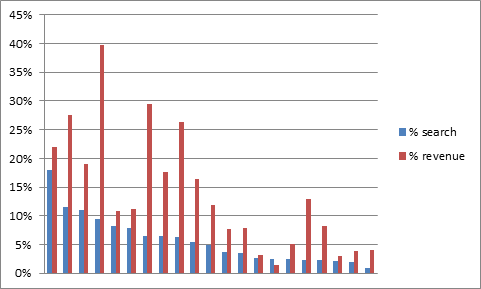As a digital agency, a main goal of most clients is to see website conversions. They want site users to not just find their website, but to also contact them or be sold on their service. With this goal in mind, we as marketers spend a lot of time on designing and optimizing sites. So when I saw the headline, "How Site Search is Killing Your Conversion Rate," I knew we had some deeper diving to do. Tuesday Tip: Learn how site search affects your user's experience and optimize this pathway.
If you're unconvinced this is a priority, here's a quick case for focusing on site search:
"43% of visitors to a site go immediately to a search boxes, and searchers are 2-3 times more likely to convert" (Forrester Research).
So nearly half of your users may be skipping all that content you work on day in and day out (your landing pages, blog posts, about us content), and you aren't paying attention to where they go. In fact, 42% of us don't have anyone assigned to this task, and another 42% say there's someone that essentially just has this on their to-do list (Screen Pages).
Lastly, if you hone in on search functionality, you could see higher ROI. Check out the graph from Screen Pages:

Image source: Kissmetrics
In every case but one, users who convert to customers via site search end up spending more money than those who don't.
Okay, so now you're convinced site search matters. What do you do about it?
Kissmetrics does a wonderful job of walking through how-to's for ecommerce sites. My ideas below are for a more general website focused on content marketing.
1. Look first at your audience and their behavior
This is ArcStone's first answer to just about everything, but that's because it's what matters most! When your audience comes to your site, where do they go? What do they want answers to? What matters to them the most?
Use tools like:
Once you deliver what your audience wants, you lower the chance they'll bounce off your site in frustration. You will be able to get them to what they want faster.
2. Optimize your content for search
Once you've discovered what people are searching for on your site, make sure you have the content to back up their searches. Revisit your content marketing strategy and amp up the content production wherever there are gaps. Moreover, be sure each post is optimized with the language your audience is typing into that search bar; work with a solid SEO strategy so you're hitting on these key phrases.
If you're finding that a blog post doesn't cover all you want to say about some of the more popular search-bar queries, consider building out landing pages for these areas. A well-designed landing page can quickly answer your audience's needs. Likewise, seeing as searchers have a higher likelihood of converting, a landing page is a great place for your most well-built form.
3. When in doubt, try a new tool
Sometimes, you can't DIY it. Kissmetrics points to 3 useful tools to help optimize your site for search. They all are a little pricey for a small budget, but you could at least try the free trials and see if they can guide your strategy:
If you need more help than that, you can always have ArcStone perform a marketing audit. Reach out to us with your questions!